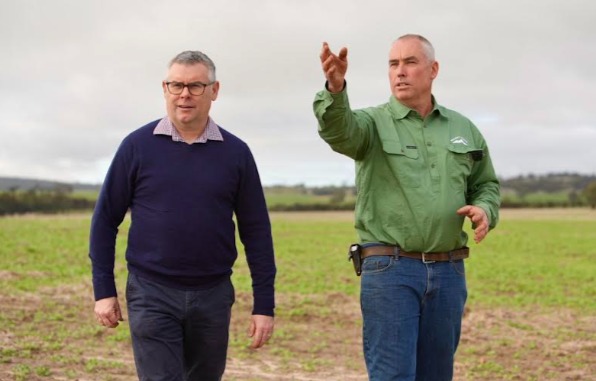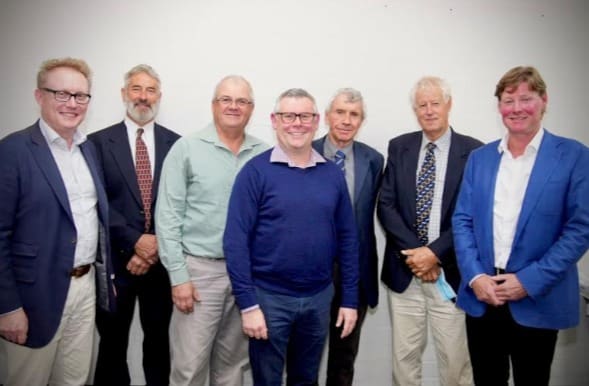
Minister for Agriculture Murray Watt, left, talks with Brookton farmer Murray Hall on his wheat and wool farm last week. Image: Supplied.
WESTERN Australian farm leaders remain resolved to fight for retention of live sheep exports despite new Minister for Agriculture Murray Watt’s insistence last week to follow party policy to phase the trade out.
WAFarmers and Pastoralists and Graziers Association leaders were impressed by Mr Watt’s willingness to meet them, but believe the Albanese Government’s policy on live exports could become an electoral issue in Western Australia and an international trade issue for the Federal Government.
Mr Watt had joint discussions with WAFarmer and PGA leaders, and also met with exporters and state government leaders.

Minister for Agriculture, Murray Watt, centre, meets with WAFarmers and PGA officials.
PGA president Tony Seabrook said the minister made the point that he had to follow Labor Party policy to phase out the live export of sheep.
“However, it was a very refreshing meeting, very open, totally different to the previous Minister; he has not brought any pre-conceived ideas to the job and he was very eager to learn and listen.”
Mr Seabrook said he told Mr Watt the meeting was an opportunity for him to go back to the ALP and convince it that the live sheep phase-out policy “deserves to be changed.”
“He sort of smiled …. but that’s what we want, we want the opportunity to put the case in such a way that if carried in debate, it might be proven that this trade is not a trade that should be shut down.”
Mr Seabrook said he would hate to think that the industry would have to engage in a political fight up to the Senate level to defeat phase-out legislation.
“It’s not the way it should happen, this is now an extremely good trade, live export around the world is growing.
“Taking Australia out of the trade really just takes the policeman out of the system, Australia sets the standard for live export around the world,” he said.
“If anyone thinks that taking Australia out of live export the world will be a better place, they absolutely kidding themselves.”
On LinkedIn after his visit Mr Watt said Labor had committed to phase out live sheep exports, due to ongoing animal welfare concerns and on his first ministerial trip to WA he met with farmers, farm workers, sheep exporters, meat processors and animal welfare groups to hear all sides of the debate.
“I made (it) clear that we won’t rush this & will consult as we implement our commitment in a fair, orderly way. I know there are strong views on this & all voices will be heard.
“I thank all who shared their views with me. It gave me a much fuller understanding of an important issue,” he posted.
Commenting on Mr Watt’s post, Thomas Elder Markets analyst Matt Dalgleish wrote: “Hearing the voices is different to listening to them and thinking about what they are saying.
“If you’re not open to changing your view upon being presented with valid evidence why the trade is important to rural/regional communities and that welfare standards continue to improve then you are just patronising the industry,” he wrote.
Mr Seabrook said he didn’t feel patronised by Mr Watt and didn’t expect him to change party policy on his first trip to the state.
“I felt that he listened and said he was more than happy to meeting with us in the future, which is something that Littleproud ran a pretty closed book on.
“I think he was genuine, how much weight he will carry in the party room, only time will tell.”
Mr Seabrook said he warned Mr Watt about WA Agriculture Minister Alannah MacTiernan’s lack of support for the trade, while state Premier McGowan and Transport Minister Rita Saffioti have supported it.
“When the state Premier comes out and says there is nothing wrong with this trade and our Minister for Transport is prepared to spend a lot of money on a harbour loading facility, that says that the Labor Party in Western Australia is not necessarily behind what MacTiernan’s policies are on live export.”
He believed the live export of sheep from Western Australia would be an electoral issue at the next Federal election if the ALP moved to close the trade down.
“We will make certain that it does, we will make absolutely certain that it does.”
Processing co-investment possibility
Mr Watt told the ABC’s Landline last week that it would be a problem if Labor made an election commitment to phase out the trade and didn’t follow through.
“But equally, I’m very willing to work with farmers and everyone who has got a stake in this industry or a view about this industry, about how we do that.”
Landline said the Minister said he knows the transition would require more meat processing workers and could see the government co-invest in a new abattoir in Western Australia. Mr Watt said the ALP went to the election with a commitment to establish a $15bn national reconstruction fund to rebuild manufacturing, including meat processing.
“And we specifically said that $500m of our national reconstruction fund would be be available for co-investment within industry within agriculture, forestry and fisheries, so there will be money available through the reconstruction fund for this and other purposes when it comes to helping agriculture makes some transitions, bring in more technology, become even more efficient and create more jobs across Australia,” Mr Watt said on Landline.
However, Mr Seabrook described the concept of government co-investment in Australian manufacturing as “farcical”.
“It will take artificial resuscitation to do that.”
He would not say “no” to the Federal Government’s reconstruction policy on co-investing in WA meat processing, but it needed to recognize that manufacturing declined in Australia due to wage growth.
“It took government a long time to get itself out of the abattoir business.”
He said if there were value-added opportunities in meat processing, processors would already be taking advantage of them. Labour availability and cost was an issue in red meat processing, but it was also part of the reason live sheep exports continued, he said.
Mr Seabrook believed there would be negative implications for other Australian exports to the Middle East if the live sheep trade was shut down.
“A country that it is a trillion dollars in debt and with interest rates rising and unemployment will come with that and possibly a recession, why an earth, ever, would you want to shut down anything?”
Mr Seabrook said the live sheep export sector now had an opportunity to convince the public and the government that the trade “is totally different to what they perceived it to be” and banning it down is unnecessary.
“We would like to convince the broader community that they don’t need to put the pressure that they are currently putting on government to ban the trade.
“Politically, the government will go whichever way they see the votes, and if the heat can evaporate out of this particular issue and we can convince everybody that having Australia in the trade is of huge benefit, not only to sheep producers in WA, but across the board to everything else we export into the Gulf, then that’s the way we should go.”
Still hope for a change on the ALP’s live sheep export policy
WAFarmers Livestock Council president Geoff Pearson said it was refreshing that Mr Watt wanted to engage so early in his government’s term and it was clear he wanted to learn about the industry.
Mr Pearson believed that from the discussions with the minister there was a chance the government’s policy on the trade would be changed.
“Yes, he’s definitely open for discussion to make a decision.
“He has got pressure from the party and the government to perform the phase-out, but he’s about learning about whether it needs to happen or not.”
On Mr Watt’s talk of red meat processing co-investment, Mr Pearson said there was already pressure on the state’s sheep processing sector, with a backlog of meat in the system.
“That gives you one indication that the red meat processing sector can’t be relied on and we need alternatives.”
Mr Pearson also believed the trade’s phase-out would become an election issue and create other general trade issues for Australia with Middle Eastern countries, including for the ME sheep meat carcase trade and other commodities. A trade phase-out would be an issue for the ALP at the next Federal election, he said.
Mr Pearson said the Federal Government removing the trade could also be a competition issue.
“It is, absolutely, it is taking a competitor out of the market, live export underpins the whole of the red meat sector, not only in sheep but in cattle.”
He said the live export sector needed to keep Mr Watt informed and keep the industry healthy consistent with its recent track record.
“Make sure that everything lines up, so that we have enough firepower to defend the industry.”
Former Agriculture Minister and Nationals leader David Littleproud lobbied for the trade in WA the week before Mr Watt’s visit and Mr Pearson said the industry also needed to looking at the numbers in Federal Parliament.
“Somewhere along the line potentially the Labor Government might only do its first term – one term.”
Productive conversations with McGowan and MacTiernan
A statement from Mr Watt to Sheep Central said his visit to Western Australia had been incredibly helpful.
“It was clear to me that people across the industry are keen to work with the new government on issues of concern.
“I’ve had very productive conversations with Premier McGowan and Minister MacTiernan since taking up the portfolio and I am looking forward to working closely with them to protect and grow the WA agriculture industry and the jobs it creates,” he said.
“I’m aware there are a range of views on live sheep exports and I made a point of meeting with a broad range of interest groups, from farmers and farm bodies, sheep exporters, meat processors and animal welfare groups.
“It’s important I listen to all opinions, in following through on Labor’s commitment,” he said.
“I recognise that sheep exporters and other groups want to see live exports continue, but my job is to honour the Albanese Government’s election commitment to phase out live sheep exports.
“We aren’t in a rush to do this, and we will continue to consult as we take the time to implement our commitment in a fair, orderly way,” Mr Watt said.
“I have made clear that there is a lot to negotiate, on how and over what timeframe we honour our commitment.”

It’s commendable and appreciated that Minister Watt is meeting with and listening to ALL stakeholders, not just those with a vested interest in the trade continuing.
One hopes science, statistics, logged data, expert veterinary advice and the records of 217 voyages as witnessed by “Independent” Observers will serve to strengthen Labor’s resolve to end the trade as quickly as possible; certainly, to legislate within this term of government for an end date.
The industry’s defence for the continuation of live sheep exports is that they have reduced the mortality rate and the trade is now well-regulated.
Two questions:
1/ why if they could reduce the mortality rate did they not do it earlier – not just under threat of closure?
2/ what do they mean by well-regulated? There are regulations in place (ASEL, AMSA MO43, and ESCAS), but there has been a breach of one or all of those regulations on at least 75pc of voyages containing sheep (see Independent Observer Reports), with no repercussions/penalties. Regulations in place with no penalties for breaching said regulations = no regulation.